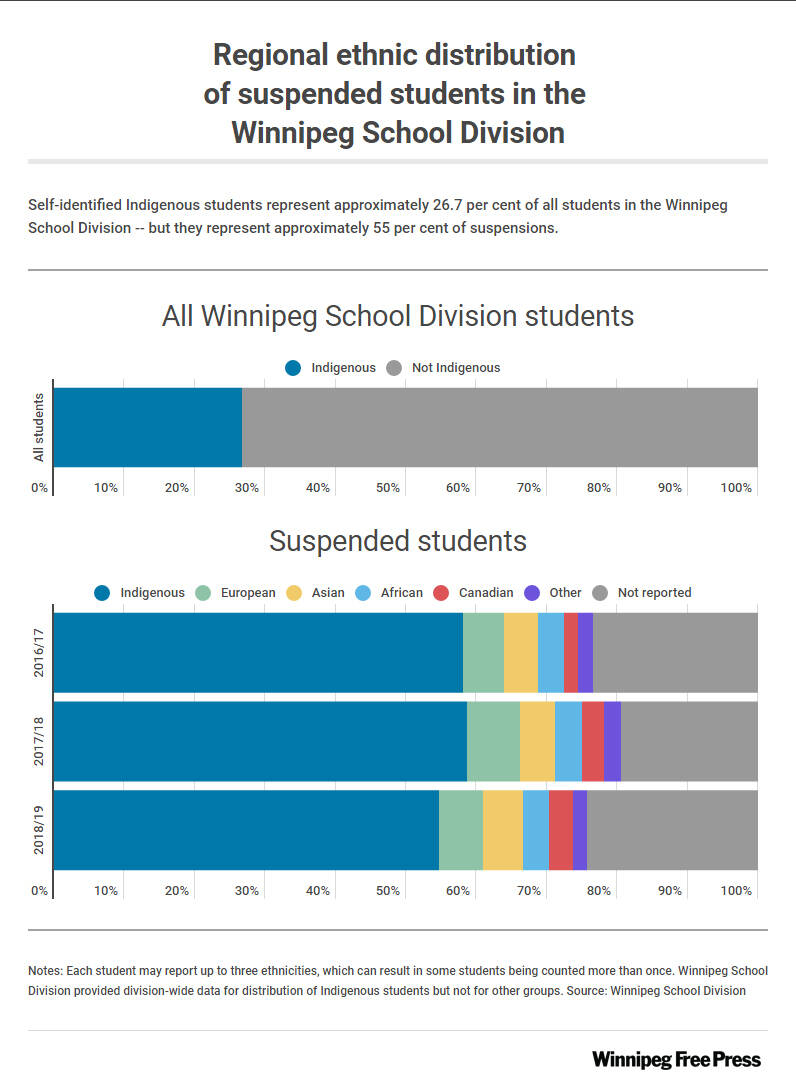‘Troubling and disheartening’: Indigenous students over-represented in WSD suspensions
Read this article for free:
or
Already have an account? Log in here »
To continue reading, please subscribe:
Monthly Digital Subscription
$0 for the first 4 weeks*
- Enjoy unlimited reading on winnipegfreepress.com
- Read the E-Edition, our digital replica newspaper
- Access News Break, our award-winning app
- Play interactive puzzles
*No charge for 4 weeks then price increases to the regular rate of $19.00 plus GST every four weeks. Offer available to new and qualified returning subscribers only. Cancel any time.
Monthly Digital Subscription
$4.75/week*
- Enjoy unlimited reading on winnipegfreepress.com
- Read the E-Edition, our digital replica newspaper
- Access News Break, our award-winning app
- Play interactive puzzles
*Billed as $19 plus GST every four weeks. Cancel any time.
To continue reading, please subscribe:
Add Free Press access to your Brandon Sun subscription for only an additional
$1 for the first 4 weeks*
*Your next subscription payment will increase by $1.00 and you will be charged $16.99 plus GST for four weeks. After four weeks, your payment will increase to $23.99 plus GST every four weeks.
Read unlimited articles for free today:
or
Already have an account? Log in here »
Hey there, time traveller!
This article was published 07/12/2021 (1463 days ago), so information in it may no longer be current.
Indigenous students are significantly overrepresented in disciplinary data and suspended far more often than any other ethnic group of K-12 learners in Manitoba’s largest school division.
A new report from the Winnipeg School Division shows students who self-identify as Indigenous — a group that makes up around 27 per cent of the population of 30,000 learners — have accounted for at least 55 per cent of suspensions in recent years.
The division released its review of out-of-school suspensions Tuesday — and in doing so, confirmed what had long been suspected among anti-racist, poverty and inner-city advocates.
“In my heart, I don’t want to turn this into finger-pointing or shame. You get nowhere when you start doing that. This is really a time for us to come together, to be reflective, and to be truthful in what’s going on,” said Betty Edel, chairwoman of the board of trustees in WSD.

The truth is critical in order to come up with an action plan to address an issue such as disproportionate suspension rates and move forward on “the path to reconciliation,” said Edel, who is Métis.
In 2019, Edel put forward a motion to have administration analyze suspension data based on student demographics. The initiative, which was backed by the board, was delayed due to the COVID-19 pandemic.
The purpose of the project — during which disciplinary data from 2016-17, 2017-18 and 2018-19 was examined — was to identify trends and review WSD’s suspension policy.
Around two per cent of the student population has been suspended, for reasons that can range from verbal assault to drug trafficking, annually during recent years. An average of 1,073 annual suspensions, involving an average of 779 students, were recorded during the years analyzed in the study.
“In my heart, I don’t want to turn this into finger-pointing or shame. You get nowhere when you start doing that. This is really a time for us to come together, to be reflective, and to be truthful in what’s going on.”
–Betty Edel, chairwoman of the board of trustees in WSD
Among the key trends determined: young men were suspended more than women and gender-diverse peers, while Indigenous women were sent home more often than non-Indigenous women.
The most common reason for a student to be temporarily banned from school is because of a physical assault on another student, per the 35-page report.
The review concluded students who were repeat offenders were given lengthier suspensions and those who had experiences with suspension generally had lower pass rates than peers.
“It’s really troubling and disheartening, but I think the emotion we need right now is anger. Racialized students are often dehumanized and punished in schools. They are assumed to be riskier and older than they are. Their feelings are often misunderstood,” said Fadi Ennab, an expert on anti-racism who is a parent in the division.
The University of Winnipeg instructor said he was disappointed the report did not mention racism because it is important to consider what leads students — at times, a toxic culture, politics and how they are treated by peers — to engage in misconduct.
Ennab also noted the ethnicity of a significant chunk of suspended students, roughly 20 per cent of pupils in each year, in the report was not noted, meaning racialized students could be even further disproportionately represented.
WSD uses a number of early intervention strategies to avoid out-of-school suspensions — including equipping staff with non-violent crisis training and providing mentorship opportunities, clinical services, and access to elders and mediators.
The division has announced plans to engage with elders and community partners to “restore relationships and address suspensions.”
The board also voted this week to establish an education equity office, which will be able to explore issues such as suspension in-depth.
Edel said it is worth both looking at how the division trains teachers in conflict resolution and polling staff on how confident they are in practicing restorative justice.
The trustee, however, said it’s important to recognize this issue is tied to poverty and other challenges that affect communities-at-large.
maggie.macintosh@freepress.mb.ca

Maggie Macintosh reports on education for the Winnipeg Free Press. Funding for the Free Press education reporter comes from the Government of Canada through the Local Journalism Initiative.
Our newsroom depends on a growing audience of readers to power our journalism. If you are not a paid reader, please consider becoming a subscriber.
Our newsroom depends on its audience of readers to power our journalism. Thank you for your support.








